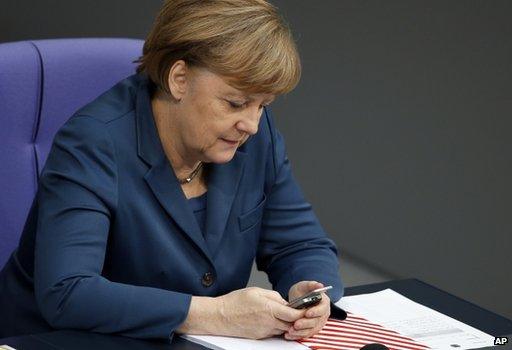Can Europe go its own way on data privacy?
- Published

German Chancellor Angela Merkel was stung by revelations that the US spied on her.
Europe could soon be operating its own cordoned-off portion of the internet if proposals by German Chancellor Angela Merkel win support.
In her weekly podcast to the German nation, Ms Merkel floated the plan to ensure European data stays on European networks.
She suggested this required beefing up Europe's data networks and implementing policies and technologies to limit how much data crosses the Atlantic.
Her proposals have been prompted by revelations by whistleblower Edward Snowden about the extent of US spying.
Germany was stung in particular by information about the way the US spied on Ms Merkel herself.
But network and computer experts say enacting the chancellor's plan ignores some truths about the net and could dent its resilience and reliability.
Europe 'already hub'
Firstly, the vast majority of data generated in Europe already stays in Europe, according to Alan Mauldin, a consultant at research firm Telegeography.
"It's not true that every time you connect to Gmail in Europe the data goes to Mountain View [Silicon Valley] and back again," he said. "The reality is that most European data currently is largely handled within Europe."
Mr Mauldin said it was hard to see how that would change under Ms Merkel's plan, adding that Europe was something of a data hub and a lot of information from other territories passed across its national and commercial networks.
Secondly, the very way that the net is built would get in the way of any plan to force data to travel according to the demands of politicians, said Adrian Kennard, director of internet provider Andrews and Arnold.
The internet gets its name because it is a "network of networks", every one of which is connected to a few of the others.
As a result, data packets can follow very different routes to their destination, and they often cross many different networks on their journey.
Each network maintains a list of the "routes" it is part of to aid this data transfer.
Altering that routing system for the sake of politics might be a bad idea, said Mr Kennard.
"Routing is a lot better when you are not bolting on loads of policy stuff," he said. "It is bad enough when routing policy is purely technical or commercially based, but if you get political in there as well it will be even worse."
There is the also the formidable problem of policing any system that demanded that European data did not stray on to non-European networks.
Spending too much time inspecting data packets to see where they are heading, might introduce a lot of "latency", or delay, he warned.
It is well known that many web applications, such as video conferencing, streaming and gaming, suffer when data takes too long to arrive.
Scrambled data
There are also better ways to protect European data from scrutiny than simply ensuring they stay on European cables, said Prof Mark Manulis, an expert in applied cryptography and network security at the University of Surrey.
A wider use of encryption could do that job much better, he said.
"Encryption was developed in order to provide protection over insecure networks," he said.
"If the email is sufficiently protected, then it does not really matter whether it is transmitted through hostile or foreign network infrastructure."
Encryption should also be applied to data when it comes to rest and not just be applied as it flows across the wires, said Prof Manulis.
He said data needed to be secured when it was stored and processed to ensure that it was seen and used only by those with the appropriate permission.
That also guaranteed that if it did go astray, it would enjoy some protection against unwarranted scrutiny, he added.
Mr Kennard explained: "At the end of the day you basically have to assume the internet could be snooped on and make use of encryption to ensure that the interconnected links cannot be snooped on whenever possible."